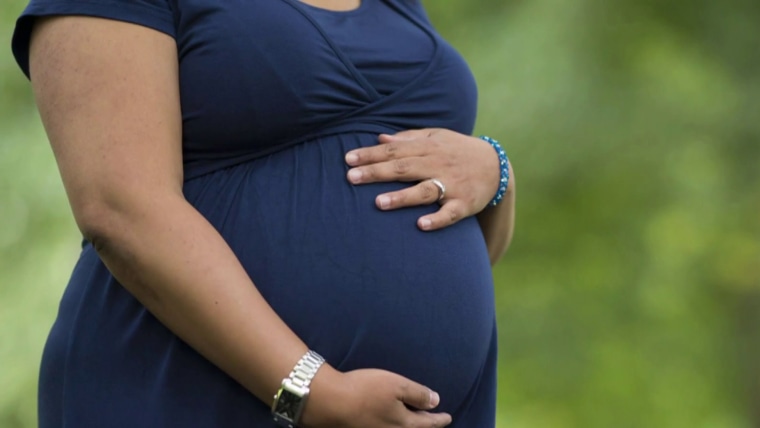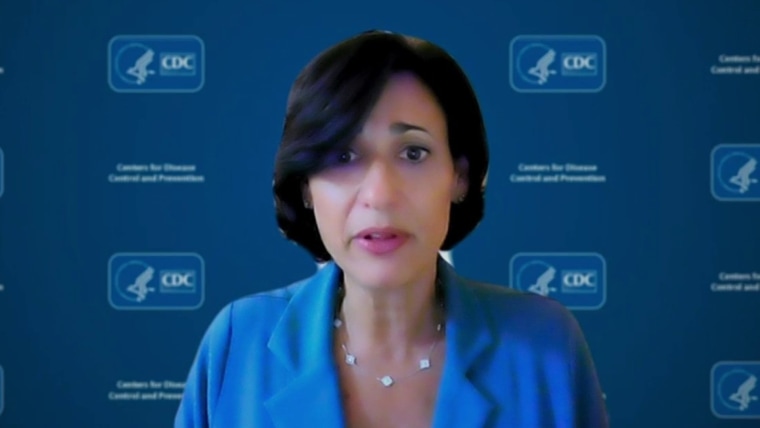Nicole Torres’ prenatal visits all start the same way: with her obstetrician inquiring whether she has received her Covid-19 shot yet.
Torres, 24, who is 33 weeks pregnant with her second daughter, has not.
It’s not because of a lack of information. Torres knows that pregnant women face a higher risk of severe illness if they catch Covid, and she has had discussions with her obstetrician about the data showing the vaccine is safe for pregnant women and their babies. She has considered getting vaccinated, but alarming claims about the vaccine that she and her husband have read online have made her question whether it is the right thing to do.
“It’s just all so new,” Torres, of Kissimmee, Florida, said. “To put yourself at risk of trying a vaccine, that’s one thing.”
“But a newborn baby,” she added, “that’s where it gets a little scary.”
Across the country, obstetricians are fighting an uphill battle in their efforts to convince pregnant women to agree to Covid vaccinations. They say misinformation, a false sense of invincibility among patients and a lack of understanding about vaccines have contributed to expectant mothers’ reluctance to get the shot.
The need to vaccinate pregnant women is urgent: They are at risk for pregnancy complications from the coronavirus, with some evidence indicating the virus might increase the chances of stillbirth. They also face a higher chance of requiring intensive care or mechanical ventilation, and nationwide, at least 159 pregnant women have died of Covid since the pandemic began, according to data from the Centers for Disease Control and Prevention.
Yet pregnant women’s vaccination rates are low: only about 25.1 percent have received at least one dose, according to the CDC, compared to 76.6 percent of adults overall in the United States who have.
"I think most people who are pregnant are generally young and generally healthy, so they don’t really expect that if they were to get this infection, that they could be as sick as we are seeing," said Dr. Brenna Hughes, vice chair of obstetrics and quality in the department of obstetrics and gynecology at Duke University. “It’s surprising to me how few people realize it can happen to them until it does.”
Why pregnant women are opting out
Vaccinations are regularly recommended during pregnancy, and other vaccines have greater acceptance among expectant mothers.
From 2019 to 2020, 61.2 percent of pregnant women received an influenza vaccination, and 56.6 percent received the Tdap, or whooping cough, vaccination, according to the CDC. Both shots have been suggested for pregnant women for years, with rich safety data to support them.
Experts say while the Covid vaccine is new, its technology — the messenger RNA, or mRNA, that is used in the two-dose shots — is not. It has been studied in clinical trials for other infections, such as Zika, the mosquito-borne virus that can cause devastating birth defects if a pregnant woman gets it.
This should reassure patients, but Hughes said a persistent concern she fields is about the long-term effects of the Covid vaccine.
She tells patients that adverse reactions to any vaccine tend to show up within days or weeks, not months or years, and while the Covid shot only began to be administered relatively recently, thousands of pregnant women have now received it, providing a large data set proving its safety record.
Other patients worry that receiving an adult-dose of a vaccine will affect their babies, said Dr. Torri Metz, associate professor of obstetrics and gynecology at University of Utah Health.
She explains to them that the vaccine allows the mother to make antibodies that will cross the placenta to her fetus.
“That’s very different than administering a vaccine to a baby,” she said.
Beyond questions about safety, some patients have expressed concerns about unclear messaging.
When the pandemic began, the CDC encouraged, but did not recommend, that pregnant women get vaccinated. In August, as hospitals across the country saw an uptick in expectant mothers who were seriously ill with the coronavirus, the nation's top health agency issued stronger guidance urging all pregnant women to get vaccinated.
“Before, they said you could get it. Now, they’re saying you should get it.”
Some patients may have perceived this as a change in stance, when in fact, the CDC had always supported the vaccine during pregnancy, Metz said.
“Before, they said you could get it. Now, they’re saying you should get it,” she said.
The CDC’s recommendation was based on new data that showed no increased risk of miscarriage for women who received at least one dose of the vaccine before 20 weeks.
Yet, for many women, the myth that the vaccine may interfere with their pregnancies is scarier than stories they see in the news of unvaccinated pregnant women who have died of Covid.
“They say things like, ‘Well, I’ll just be really careful,’ and I try to tell them that everybody’s being really careful, and that’s sometimes just not enough, especially with how prevalent the virus is right now,” Metz said.
Dr. Jennifer Thompson, an associate professor of obstetrics and gynecology at Vanderbilt University, said her institution has been dispelling false rumors about the vaccines through handouts and town halls on social media.
As a high-risk obstetrician, she cares for patients with many different medical conditions, and every time a patient opts to get vaccinated, she said she feels relief.
“Yes, the majority of patients overall have more mild disease, but we don’t know just by looking at you if you are going to be someone that is going to be so ill you end up in the ICU,” she said. “It’s just sad when we see so many people who are sick with Covid or admitted to the ICU when we have something that can prevent this.”
“I’ve met some other pregnant women that are pretty far along who say they have stopped going to their regular OB check-ups because they are tired of hearing the vaccine thing.”
For Torres, the Florida mother who is unsure whether to get vaccinated before the birth of her second daughter, the thought of requiring hospitalization as a result of Covid complications is terrifying. But having doctors repeatedly suggest that she get vaccinated has not had the intended effect on her — or on some other expectant moms she has spoken with.
“I don’t like feeling pressured,” she said. “I’ve met some other pregnant women that are pretty far along who say they have stopped going to their regular OB check-ups because they are tired of hearing the vaccine thing.”
Article From & Read More ( Doctors desperately want pregnant women to get vaccinated. It's an uphill battle. - NBC News )https://ift.tt/3EKh4CQ
Health


No comments:
Post a Comment